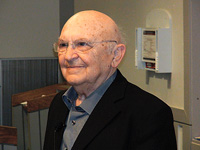By Beth Kissileff, JTNews Correspondent
One would not expect a novel about a battered woman and her protectors, identity confusion, and murder to be written by a male septuagenarian Holocaust survivor. But as one of Aharon Appelfeld’s characters says, “Contradictions don’t put me off.”
Appelfeld’s newest novel to appear in English — Until the Dawn’s Light, published in Hebrew in 1995 — draws on his experiences surviving World War II by hiding with criminals between the ages of 8 and 14. Appelfeld, author of 39 books, is a master storyteller and allegorist. He recently made his first visit to the U.S. in a decade, for a two-day conference on his life and work at the University of Pennsylvania.
This novel, set at an indeterminate time in pre-World War II Europe, features a Jewish woman, Blanca, who converts to Christianity to marry a non-Jewish man, Adolf, who abuses her. Blanca does not take care of her father once her mother has passed away, allowing her father to return alone at night to an old-age home (Adolf will not let him in their home), and the father goes missing.
Blanca gives birth to a child and can’t tell the news to her blind grandmother, who stands outside the now-closed synagogue, cursing the converts. She is afraid to speak to her grandmother because of her disapproval of Blanca’s conversion and marriage to a non-Jew. The irony in their world is that when the man from the burial society says “We Jews stand by one another” at the funeral of Blanca’s mother, the crowd realizes “most of them were converts.” Yet, there is still a core of faith in them — Blanca remembers her mother saying “There is a God in heaven and he watches over all his creatures.” Her father argues that this is her ancestors’ faith, not her own, yet her mother counters, “mine too, if I may.”
The attenuated Jewish faith of Blanca the convert, abused by her Christian husband and his family, is preserved through the ministrations of Dr. Nussbaum, whose own daughter Celia, Blanca’s classmate, discovers how Jewish she feels reading Martin Buber in the convent Celia has joined. Celia has come to realize that her Jewish forebears “were truly the flesh of her flesh.” Dr. Nussbaum’s care for Blanca and her child helps him cope with being cut off from his daughter the nun.
However, like Appelfeld himself said during his visit that he had “no messages, only words,” Blanca sinks “deeper and deeper into writing” to create her life and memories through her imagination. Blanca comes to realize that “Death isn’t darkness if you take your dear ones with you. It’s just a change in place.” Blanca and the people around her are living in a world on the cusp of being destroyed, and their hope is to find a way out.
Contradictions and all, Appelfeld has again shown readers the way that fictional Jews in the liminal world of Europe between the wars coped with the uncertainties of their lives.
